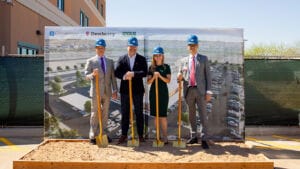The $3.5 billion plan to tap into the State Land Trust could be the answer to settling a long-running lawsuit and put more money into classrooms without raising taxes, but what impact will the plan have on commercial real estate?
A voter-approved referendum in Arizona has required lawmakers to provide annual inflation-based increases to K-12 education.
The lawsuit stems from the state’s decision to halt school spending during the recession, an economic downturn that severely crippled the housing and construction industries. Schools sued over the loss of the inflation funding.
To settle the lawsuit and to improve education, Gov. Doug Ducey recently approved an initiative intended to pump $3.5 billion into K-12 education over the next decade. About $2 billion of the funding going to schools will come from the sale of trust land, by increasing the payout to 6.9 percent from 2.5 percent of total value.
“That speaks to our commitment to our kids,” Ducey says. “We are able to increase funding to education without raising taxes and we are going to be able to show that we are getting results. That’s what most important — the results we get in the classrooms from this money.”
But will the initiative end up with more delevopable land becoming available to the commercial real estate industry?
“As far I understand, there is no impact to the commercial real estate industry,” says Kuldip Verma, CEO of Vermaland, a Phoenix-based land banking and land development company. “The distribution of the trust will be different. However, there will be no increase in the amount of land sold or changes to the prices of the land being sold.”
The Arizona State Land Department manages approximately 9.2 million acres of State Trust lands.This land is held in trust and managed for the sole purpose of generating revenues for the 13 State Land Trust beneficiaries, one of which is Arizona’s K-12 education system.
“We should have the best school systems in the country with what we have at our fingertips,” says Nate Nathan, president and designated broker with Nathan & Associates.
Nathan and other experts agree that the land owned by the State Land Trust is some of the most valuable in the state and maybe in the country. But, changing where the money goes from the sale of trust land doesn’t mean the commercial real estate will be impacted by the initiative.
Experts says it all depends on how much land in released and at what price, but Verma predicts that the same quality and quantity of land being already being sold will continue. He says where the funds from the sale are directed will be the only thing to change.
But the real estate market as a whole is showing signs of life and trust land sales could pick up.
“The overall land market and volume should be very robust in the next seven years compare with the previous seven years,” says Greg Vogel, founder and CEO of Land Advisors Organization.
In 1985, Maricopa County voters approved the passage of a proposition that allowed for a one-half cent sales tax increase to fund freeway construction with a portion designated as seed money for regional transit service expansion.
In 2006, the State Land Trust began to bring out the parcels along the new transit corridors, Nathan says. But because the economy was bad, many of these parcels never sold.
Now that the market has recovered, experts predict the next wave of Metro Phoenix development will come from transit corridors and where city boundaries run up against trust land. Because much of that land is owned by the state trust, schools could be cashing in, experts say.
“The demand is there,” Nathan said.
In these high-growth areas, the State Land Trust parcels could help Ducey’s initiative create a lot of value on which to capitalize, funneling much of that money into Arizona schools.
The deal still requires voter approval in a May 17 special election.




